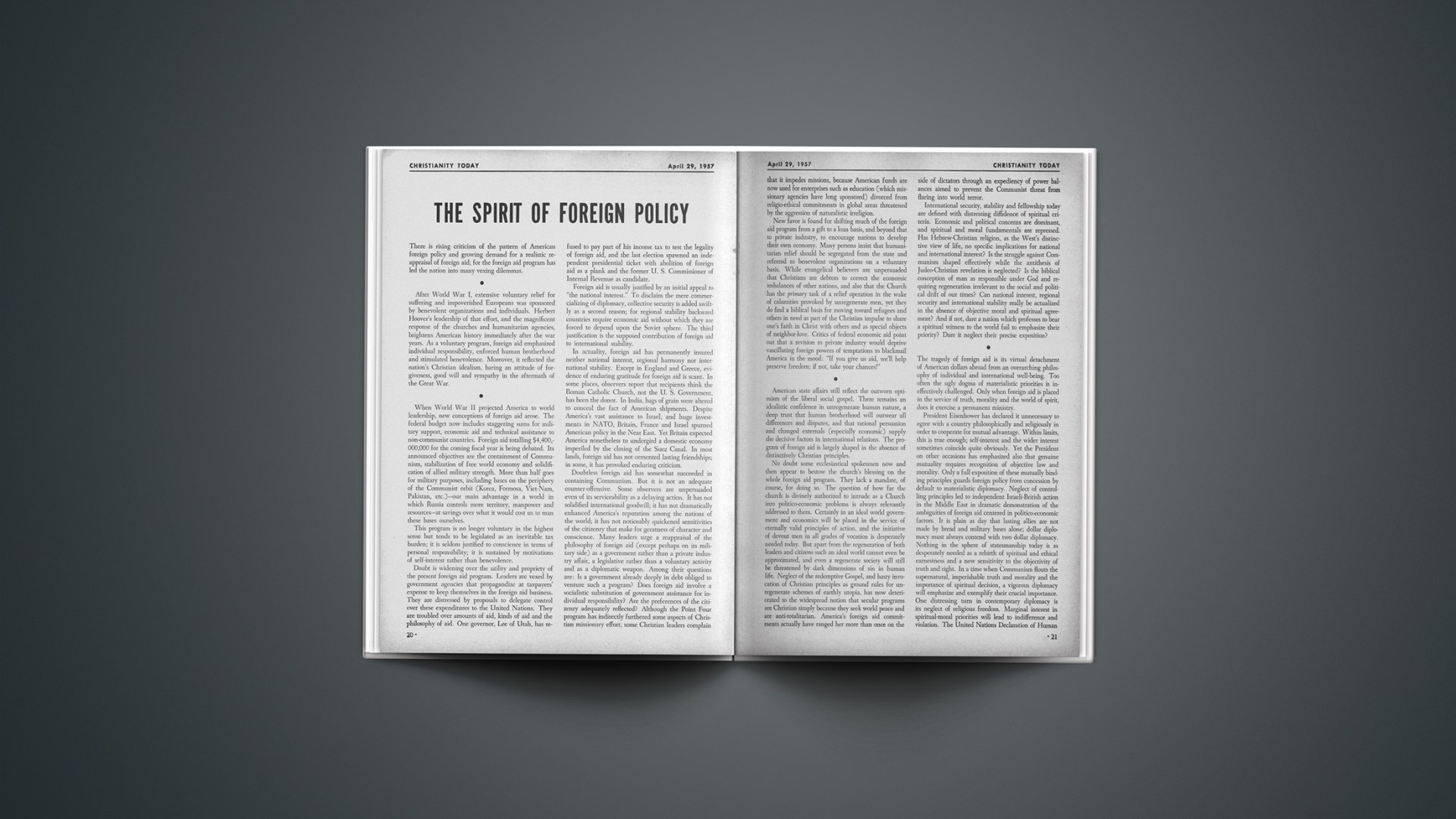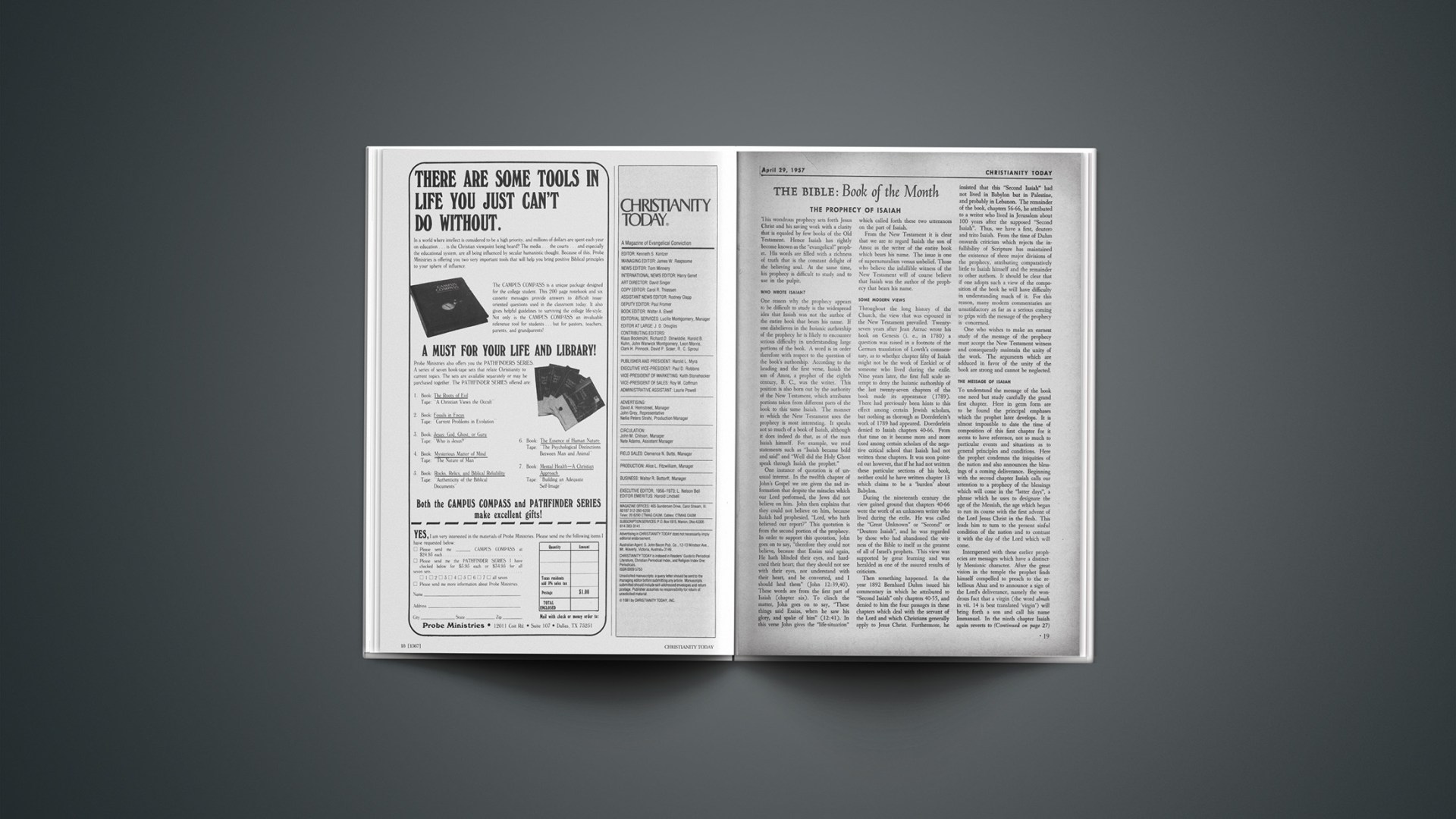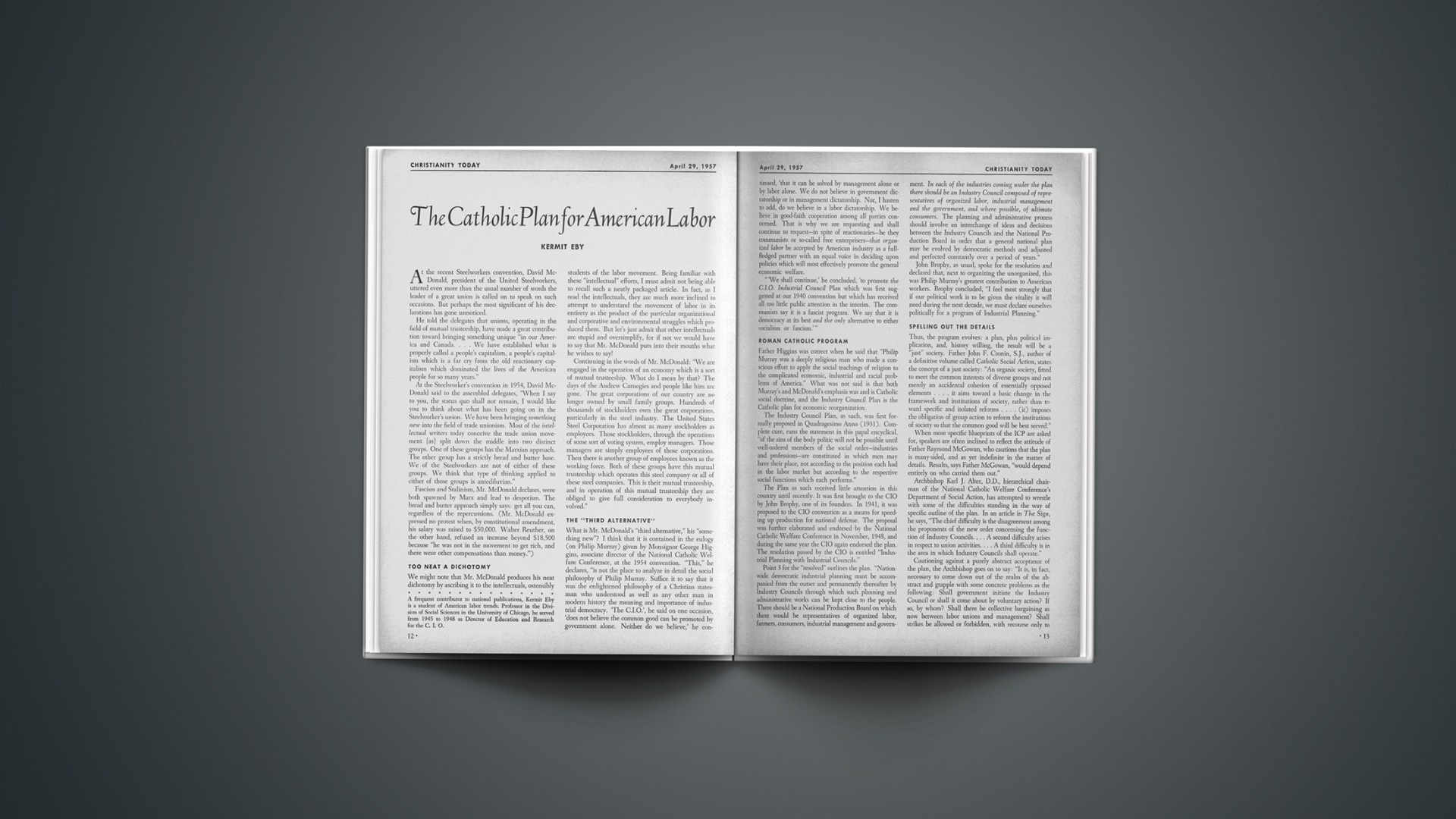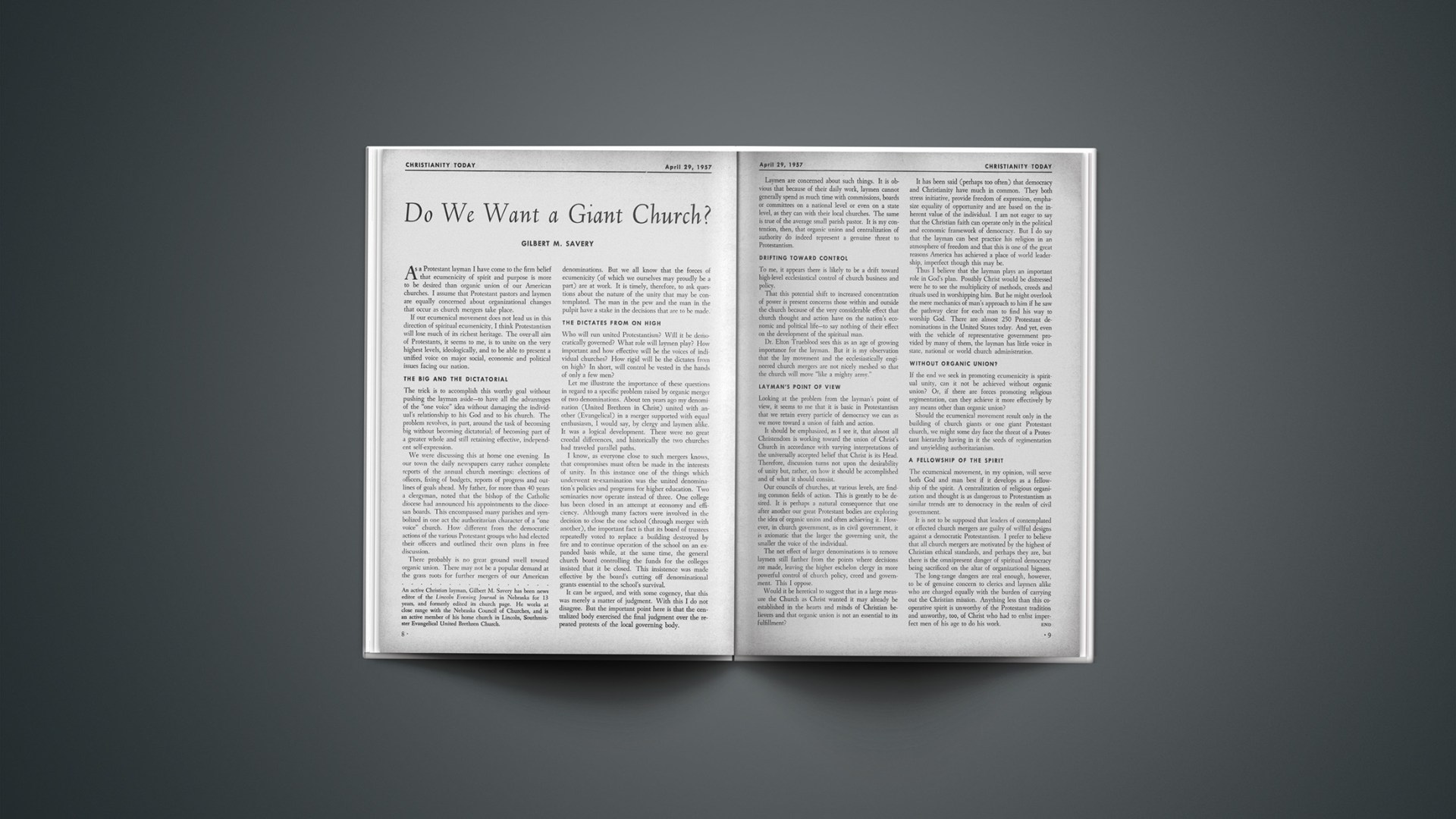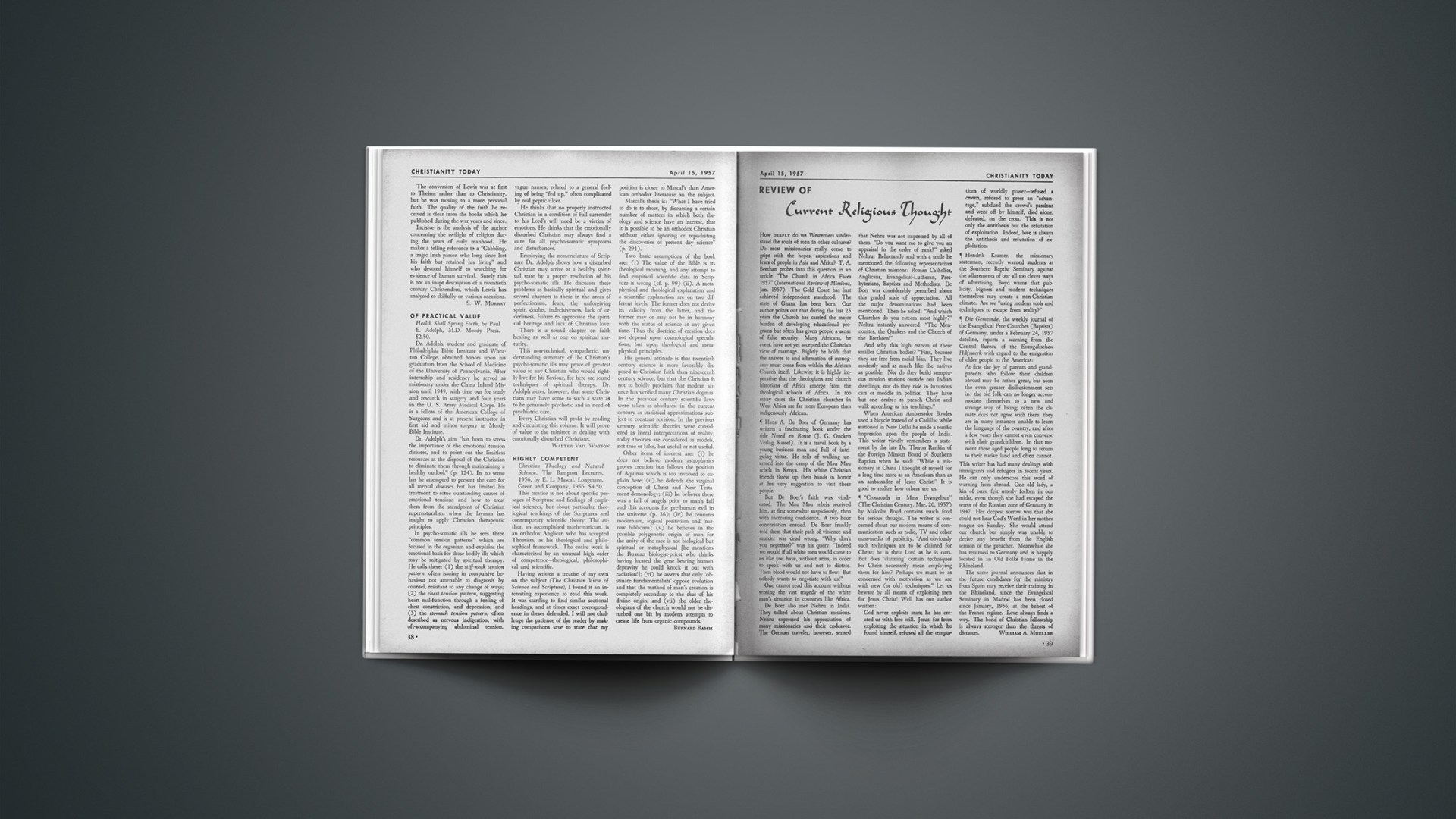The Spirit Of Foreign Policy
There is rising criticism of the pattern of American foreign policy and growing demand for a realistic reappraisal of foreign aid; for the foreign aid program has led the nation into many vexing dilemmas.
After World War I, extensive voluntary relief for suffering and impoverished Europeans was sponsored by benevolent organizations and individuals. Herbert Hoover’s leadership of that effort, and the magnificent response of the churches and humanitarian agencies, brightens American history immediately after the war years. As a voluntary program, foreign aid emphasized individual responsibility, enforced human brotherhood and stimulated benevolence. Moreover, it reflected the nation’s Christian idealism, baring an attitude of forgiveness, good will and sympathy in the aftermath of the Great War.
When World War II projected America to world leadership, new conceptions of foreign aid arose. The federal budget now includes staggering sums for military support, economic aid and technical assistance to non-communist countries. Foreign aid totalling $4,400,000,000 for the coming fiscal year is being debated. Its announced objectives are the containment of Communism, stabilization of free world economy and solidification of allied military strength. More than half goes for military purposes, including bases on the periphery of the Communist orbit (Korea, Formosa, Viet-Nam, Pakistan, etc.)—our main advantage in a world in which Russia controls more territory, manpower and resources—at savings over what it would cost us to man these bases ourselves.
This program is no longer voluntary in the highest sense but tends to be legislated as an inevitable tax burden; it is seldom justified to conscience in terms of personal responsibility; it is sustained by motivations of self-interest rather than benevolence.
Doubt is widening over the utility and propriety of the present foreign aid program. Leaders are vexed by government agencies that propagandize at taxpayers’ expense to keep themselves in the foreign aid business. They are distressed by proposals to delegate control over these expenditures to the United Nations. They are troubled over amounts of aid, kinds of aid and the philosophy of aid. One governor, Lee of Utah, has refused to pay part of his income tax to test the legality of foreign aid, and the last election spawned an independent presidential ticket with abolition of foreign aid as a plank and the former U. S. Commissioner of Internal Revenue as candidate.
Foreign aid is usually justified by an initial appeal to “the national interest.” To disclaim the mere commercializing of diplomacy, collective security is added swiftly as a second reason; for regional stability backward countries require economic aid without which they are forced to depend upon the Soviet sphere. The third justification is the supposed contribution of foreign aid to international stability.
In actuality, foreign aid has permanently insured neither national interest, regional harmony nor international stability. Except in England and Greece, evidence of enduring gratitude for foreign aid is scant. In some places, observers report that recipients think the Roman Catholic Church, not the U. S. Government, has been the donor. In India, bags of grain were altered to conceal the fact of American shipments. Despite America’s vast assistance to Israel, and huge investments in NATO, Britain, France and Israel spurned American policy in the Near East. Yet Britain expected America nonetheless to undergird a domestic economy imperiled by the closing of the Suez Canal. In most lands, foreign aid has not cemented lasting friendships; in some, it has provoked enduring criticism.
Doubtless foreign aid has somewhat succeeded in containing Communism. But it is not an adequate counter-offensive. Some observers are unpersuaded even of its serviceability as a delaying action. It has not solidified international goodwill; it has not dramatically enhanced America’s reputation among the nations of the world; it has not noticeably quickened sensitivities of the citizenry that make for geratness of character and conscience. Many leaders urge a reappraisal of the philosophy of foreign aid (except perhaps on its military side) as a government rather than a private industry affair, a legislative rather than a voluntary activity and as a diplomatic weapon. Among their questions are: Is a government already deeply in debt obliged to venture such a program? Does foreign aid involve a socialistic substitution of government assistance for individual responsibility? Are the preferences of the citizenry adequately reflected? Although the Point Four program has indirectly furthered some aspects of Christian missionary effort, some Christian leaders complain that it impedes missions, because American funds are now used for enterprises such as education (which missionary agencies have long sponsored) divorced from religio-ethical commitments in global areas threatened by the aggression of naturalistic irreligion.
New favor is found for shifting much of the foreign aid program from a gift to a loan basis, and beyond that to private industry, to encourage nations to develop their own economy. Many persons insist that humanitarian relief should be segregated from the state and referred to benevolent organizations on a voluntary basis. While evangelical believers are unpersuaded that Christians are debtors to correct the economic imbalances of other nations, and also that the Church has the primary task of a relief operation in the wake of calamities provoked by unregenerate men, yet they do find a biblical basis for moving toward refugees and others in need as part of the Christian impulse to share one’s faith in Christ with others and as special objects of neighbor-love. Critics of federal economic aid point out that a revision to private industry would deprive vascillating foreign powers of temptations to blackmail America in the mood: “If you give us aid, we’ll help preserve freedom; if not, take your chances!”
American state affairs still reflect the outworn optimism of the liberal social gospel. There remains an idealistic confidence in unregenerate human nature, a deep trust that human brotherhood will outwear all differences and disputes, and that rational persuasion and changed externals (especially economic) supply the decisive factors in international relations. The program of foreign aid is largely shaped in the absence of distinctively Christian principles.
No doubt some ecclesiastical spokesmen now and then appear to bestow the church’s blessing on the whole foreign aid program. They lack a mandate, of course, for doing so. The question of how far the church is divinely authorized to intrude as a Church into politico-economic problems is always relevantly addressed to them. Certainly in an ideal world government and economics will be placed in the service of eternally valid principles of action, and the initiative of devout men in all grades of vocation is desperately needed today. But apart from the regeneration of both leaders and citizens such an ideal world cannot even be approximated, and even a regenerate society will still be threatened by dark dimensions of sin in human life. Neglect of the redemptive Gospel, and hasty invocation of Christian principles as ground rules for unregenerate schemes of earthly utopia, has now deteriorated to the widespread notion that secular programs are Christian simply because they seek world peace and are anti-totalitarian. America’s foreign aid commitments actually have ranged her more than once on the side of dictators through an expediency of power balances aimed to prevent the Communist threat from flaring into world terror.
International security, stability and fellowship today are defined with distressing diffidence of spiritual criteria. Economic and political concerns are dominant, and spiritual and moral fundamentals are repressed. Has Hebrew-Christian religion, as the West’s distinctive view of life, no specific implications for national and international interest? Is the struggle against Communism shaped effectively while the antithesis of Judeo-Christian revelation is neglected? Is the biblical conception of man as responsible under God and requiring regeneration irrelevant to the social and political drift of our times? Can national interest, regional security and international stability really be actualized in the absence of objective moral and spiritual agreement? And if not, dare a nation which professes to bear a spiritual witness to the world fail to emphasize their priority? Dare it neglect their precise exposition?
The tragedy of foreign aid is its virtual detachment of American dollars abroad from an overarching philosophy of individual and international well-being. Too often the ugly dogma of materialistic priorities is ineffectively challenged. Only when foreign aid is placed in the service of truth, morality and the world of spirit, does it exercise a permanent ministry.
President Eisenhower has declared it unnecessary to agree with a country philosophically and religiously in order to cooperate for mutual advantage. Within limits, this is true enough; self-interest and the wider interest sometimes coincide quite obviously. Yet the President on other occasions has emphasized also that genuine mutuality requires recognition of objective law and morality. Only a full exposition of these mutually binding principles guards foreign policy from concession by default to materialistic diplomacy. Neglect of controlling principles led to independent Israeli-British action in the Middle East in dramatic demonstration of the ambiguities of foreign aid centered in politico-economic factors. It is plain as day that lasting allies are not made by bread and military bases alone; dollar diplomacy must always contend with two dollar diplomacy. Nothing in the sphere of statesmanship today is as desperately needed as a rebirth of spiritual and ethical earnestness and a new sensitivity to the objectivity of truth and right. In a time when Communism flouts the supernatural, imperishable truth and morality and the importance of spiritual decision, a vigorous diplomacy will emphasize and exemplify their crucial importance. One distressing turn in contemporary diplomacy is its neglect of religious freedom. Marginal interest in spiritual-moral priorities will lead to indifference and violation. The United Nations Declaration of Human Rights commendably recognizes religious freedom as a basic human right. Already in apostolic times Christian leaders resisted government authorities who interfered with their preaching of the Gospel. Totalitarian powers, recognizing no authority superior to the state, are hostile to religious freedom; they tolerate religion, if at all, only in a form that places religion in the service of the state. Religious freedom doubtless has its risks; it can deteriorate into a secular desire for freedom from religion. Yet it provides society with an escape from the false gods of totalitarianism.
Demands are growing that the United States curtail foreign aid (except for humanitarian relief) to nations not guaranteeing religious freedom. These pressures have mounted in view of Roman Catholic persecution of Protestant minorities in Colombia, now getting attention from the foreign relations committee of the U. S. Senate. In the past, religious freedom has been tied to every American treaty with a foreign power, covering citizens of both lands abroad, but not nationals. Many recent treaties stipulate freedom of religious activities for Americans in foreign lands. Sometimes this phrase proves ambiguous, since by religious freedom Christians mean both the right to worship and to propagate religious views. Distressingly, however, the recent treaty with Haiti omits even the abbreviated provision covering citizens abroad. This American trend in the matter of foreign aid and religious freedom needs careful scrutiny. Impediments to freedom of religious activity of Americans in Saudi Arabia have provoked protests against treaties omitting religious guarantees.
The neglect of spiritual-moral priorities in foreign policy declines easily into an insensitivity to the value of religious freedom; enthusiasm for religious liberty cheapens to the acceptance of mere religious tolerance. The next step is indifference to religious rights.
There is another step: esteeming religion for sheer purposes of propaganda.
The official propaganda voice of the United States abroad is the United States Information Agency, of which the Voice of America is the broadcasting arm. In recent years U.S.I.A. libraries throughout the free world have given a “slanted” impression of American religious life through the virtual exclusion of evangelical literature. Happily the U.S.I.A., at long last, is slowly moving to rectify this misimpression by approving literature more reflective of American religious life. The Voice of America also currently shows a fairer measure of evangelical participation. The Voice has made commendable gains over days when its staff included left-wing writers (some were holdovers from the era when Russia was an ally) who were naively expected to forge an effective case against communism, although they were themselves naturalists.
This is not to say that the U.S.I.A. satisfactorily mirrors spiritual-moral priorities in its current crusade for freedom. Reflecting the growing diversification of American outlook, it is concerned with proportions more than with priorities. Moreover, its nebulous religious policy specially disadvantages the Christian heritage, America’s cherished tradition and the major religious factor in its contemporary life. A temperament that exalts all religions indiscriminately and blurs out genuine distinctions between religions, inevitably neglects the Hebrew-Christian heritage.
The Voice of America has even been guilty of serious transgression in its handling of religion. On one occasion at least it has cheapened religion to an instrument of diplomacy. An illustration of this retrogression appears in the Voice of America Bulletin in Persian for October–November 1956. Its inside front cover, in observance of Mohammed’s birth, states:
“… Dr. Trueblood, the distinguished American writer and speaker [Chief of Religious Information for the U.S.I.A. in 1954, Professor Trueblood assisted in shaping its present religious policy—ED.] writes …:
“ ‘… It is fitting that we in America, from the standpoint of Christianity, which is the religion of the majority of the people, should speak of the prophet of Islam. Following the religion of Christ does not prevent us from considering the life and teachings of the prophet of Islam with amazement and praise. It is suitable that in our own society which includes the followers of various religions, we should glorify [original: “salute”—ED.] the prophet of Islam.
“ ‘If we bear in mind that all the great religions of the world essentially encourage people to the worship of God and to good works, and that every individual person of the human race sees truth only from his limited viewpoint, we discover how much better it is that the truth should shine forth from different shrines and become lamps on the path of God’s humanity. On this account we have spiritual delight in seeing the beautiful mosque of the Moslems in the city of Washington and rejoice in looking on that great and splendid building. I as a Christian especially praise sincerely two points in his teachings: … his insistence on the unity of God and … his rejection of all sorts and forms of idolatry.…
“ ‘… On the eve of the birthday of the prophet of Islam we glorify [original: “salute”—ED.] him and send congratulations to all the Moslems of the world.’ ”
While features common to the monotheistic faiths must not be neglected, Dr. Trueblood more than disappoints us in this handling of Christianity and Islam. Since in Persian the term “Prophet” is used theologically, his words are the equivalent (to the Persian reader) of a declaration of faith in Mohammed’s claim to be sent from God and to be the seal of all other prophets including Jesus. When such utterances are published at public expense, as officially reflective of American opinion, they call for rebuke. Director of U.S.I.A. Arthur Larson has said: “It is up to us to see that the truth about what we stand for … is at all times available to interested people around the world.” That truth will not bypass America’s Christian heritage from the past and its Christian vigor in the present. Dr. Trueblood’s statement, fortunately, is unrepresentative of Voice of America policy and pronouncements and constitutes a glaring exception. Even when allowance is made for changes in the translation of Dr. Trueblood’s remarks from English to Persian and back to English [the Voice of America is always in the market for abler translators], the deference to Islam for political propaganda purposes is undeniable. Non-Christian religion is flattered and encouraged, and the tax-supported policy of the American government casts weight against the Christian witness of American foreign missionaries. Dr. Trueblood’s remarks deteriorate American propaganda to a hypocritical level. In fact, they stand condemned by U.S.I.A.’s own stated policy that “religion is debased when used as a weapon.…”
The drift of ambiguous foreign policy and foreign aid should be plain. The neglect of spiritual priorities sooner or later accommodates a mood in politics in which the disposition of religion is governed by what is diplomatically serviceable. This is merely one notch above the mood in which religion is despised, and irreligion prized, because this too is expedient.
American policy-makers, unfortunately, agonize all too little over spiritual-moral realities. The nation, happily, can still profit from its mistakes. If it does not, exceptions may some day become the rule. What foreign policy needs most of all is a rebirth of spirit.
Evangelism: By Isolation Or By Participation?
The modern evangelical like all his contemporaries finds himself in a world of turmoil and chaos, but if he knows anything about history, there continually recurs to him a number of searching questions. In the past, Christians seem to have wielded a strong influence on the world for good, but today their impact seems often to be practically non-existent. Why should this be? Where today are the Augustines, the Calvins, the Knoxes, the Wesleys, the Wilberforces and men like them? Has Christianity lost its power? Or is it that the Church has failed to fulfill its obligations? Why does Christianity appear to so many to be irrelevant?
As one looks back over the past two thousand years of Church History for some answer, one is impressed by the fact that the Christians of bygone days made their influence felt in and on the world by going down into its midst. Paul was not afraid to argue with the philosophers in the Athenian market place; Calvin struggled with the political, social and economic problems of Geneva; Wilberforce and the Clapham Sect fought hard in and out of parliament to destroy the slave trade. They entered the world in order to overcome it, to bring a Christian influence to bear upon it and so to turn it to him who is its true Lord.
During the nineteenth century, however, partially as a result of Puritan and Pietist tradition and partially as a result of the great economic and intellectual upsurge of the time, Christians seem to have developed a somewhat different attitude to the world. “The world” was evil, and the Christian, born again by the Spirit, should have as little to do with it as possible lest he be defiled. The result was a type of “separated life” thinking, both individual and corporate, which resulted in the attitude that while one had to work in the world in order to live, in all other activities of life one’s contacts with non-Christians should be as limited and infrequent as possible.
For the world and for the Church the result has been near disaster. On one hand Christians, particularly since the days of Darwin, have largely avoided the field of secular scholarship. Biblical learning, they feel, is quite respectable, but the fields of science, art, the humanities or social studies being “worldly” are to be avoided. Thus any Christian influence on scholarship has been almost entirely lost.
On the other hand, social and personal relationships have also ceased to feel the impact of Christian thinking and principles. Politics are “dirty” so the Christian must keep clear of them. Trade unions are “secular” so no Christian should take a part in their activities. That the Christian is in the world but not of it, unfortunately, comes to mean that the Christian is to hand the world and all God’s gifts in it over to unbelief.
By adopting this attitude the Christian has lost contact with the world. He seems to feel therefore, that all he can do is stand over against it and preach at it, for if he should come too close his hands might be soiled. What a contrast to the attitude of Christ whose friends were “publicans and sinners!”
What is needed then, is that Christians should go into the world. It is of little use to “throw out the life line” unless we are prepared to go over the side to lay hold upon those who are too far gone to grasp the rope for themselves. “Worldliness” is not going into the world and taking part in the moral or amoral activities of the unregenerate man. “Worldliness” is fundamentally an attitude to life in which one exalts the world to the position of the ultimate good. If, however, one is in the world for Christ, to live and wield an influence for him, one will certainly treat the world in the proper Christian manner.
Evangelization is not by isolation but rather by participation.

